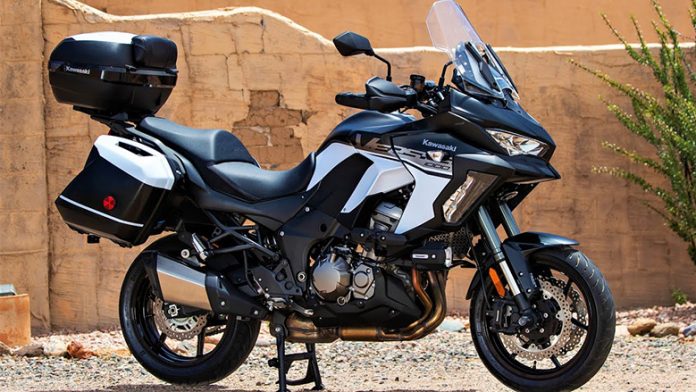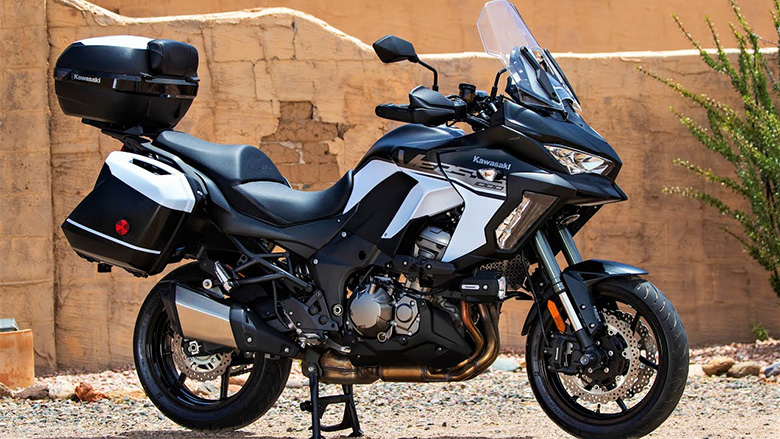The most suitable motorbike for sports riding and touring has become even better. The brand new 2020 Versys 1000 LT is packed with improvements that enhance its ride excitement and torment ability. Riders can choose between the Versys 1000 LT and SE models with additional high-tech features such as Kawasaki Electronic Control Suspension (KECS), Integrated Riding Modes, Dual Direction KQS, LED Corning Lights, and TFT Dashboard with Bluetooth. ۔ Connection Whether you enjoy a sports ride or touring, the Versys 1000 LT is your adventure friend on the broad road.
Kawasaki 2020 Versys 1000 ABS LT Canada Sports Tourer – Features
Inertial Measurement Unit (IMU) for a robust electronic riding aid package. The standard cruise control system is integrated with the electronic throttle valve—Standard Accessory Adjustable Windscreen with KQRTM Saddle Bags and Handguards.
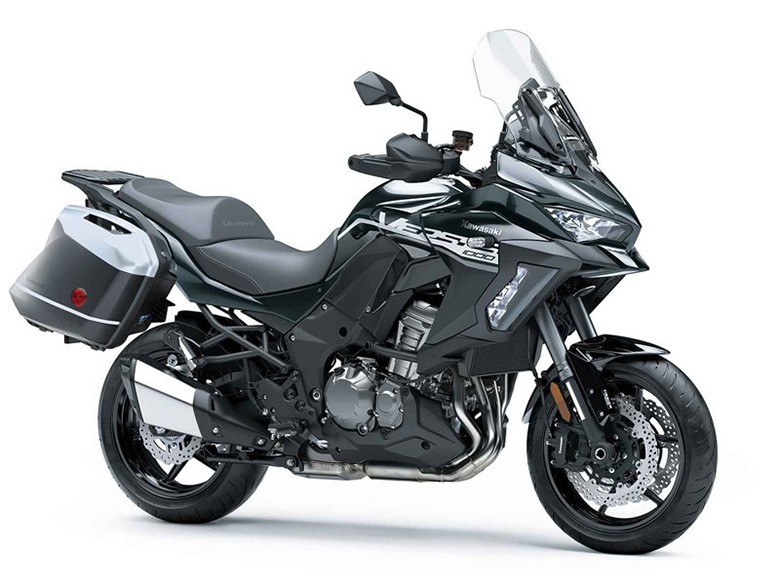
Rider Aids
Kawasaki’s state-of-the-art electronics have always performed brilliantly because of the highly sophisticated programming that gives the ECU a precise real-time image of what the chassis and frame are doing with minimal software. The electronic management technology on the Versys® 1000 SE LT + motorbike incorporates the latest iterations of Bosch IMU and Kawasaki’s unique dynamic modeling software so that riders can enjoy the ride with increasing confidence. IMU calculates inertia with five axes: longitude, transition, and vertical velocity; Roll rate; And pitch rate. ECU calculates Yao’s rate with Kawasaki’s unique software so that the six-axis chassis can provide lean angle and acceleration/delirium force for more accurate electronic auxiliary riding control.
Corner Management Function
The Corner Management Function uses both KIBS and KTRC to help riders maintain their planned trajectory around a corner by reducing the tendency of the bike to rise when applied to the brakes. Based on the motorcycle’s lean and pitch angles, IMUs help the input system maintain maximum hydraulic pressure. The same approach is based on Ninja H2TM and Ninja ZXTM-10R bikes with better program settings to meet the performance requirements of Versys 1000 SE LT +. A Supersports-inspired high-accuracy system with smooth feedback to increase braking confidence.
Power Mode
Allows cyclists to customize power features according to their riding style and conditions. Riders can choose between full power and low power operation, approximately 75% of total control with mild throttle response.
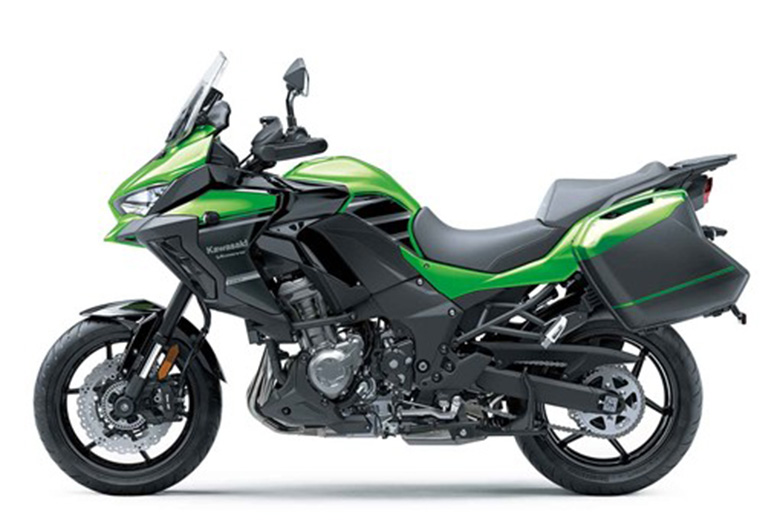
Electronic Cruise Control
Allows the user to maintain the desired speed with a simple push of a button instead of constantly modulating the throttle. When traveling long distances, it relieves tension on the right-hand side, making walking and riding more accessible.
When encountering an ascending or falling gradient, the engine’s power is automatically regulated by electronic throttle valves to maintain proper speed. The “+” and “-” buttons can change specific rates.
Radiology of the App Smartphone Connectivity (Do not operate smartphone while riding)
With the Bluetooth chip embedded in the device panel, riders can connect to their motorbike remotely. The various features of the devices can be accessed through the smartphone application “Radiology the App,” which makes the ride experience better.
Available functions:
- Vehicle information: The smartphone can display the fuel gauge, odometer, and maintenance schedule.
- Riding Log: Can be used to log smartphones and view GPS route information and vehicle operating information.
- Telephone notifications: When the smartphone receives a call or message, the device appears on display.
- Basic settings: Smartphones can be used to change the display settings of a specific device (such as preferential units, date, date format, etc.).
Chassis
The new Kawasaki 2020 Versys 1000 ABS LT Canada Sports Tourer comes with a solid aluminum twin-tube frame design that contains frame beams allowing a narrow construction that is extremely easy to grip with the knees. The lightweight and highly rigid frame use the engine as a stressed member while the structure helps in contributing to optimum handling, offering a firm turning experience.
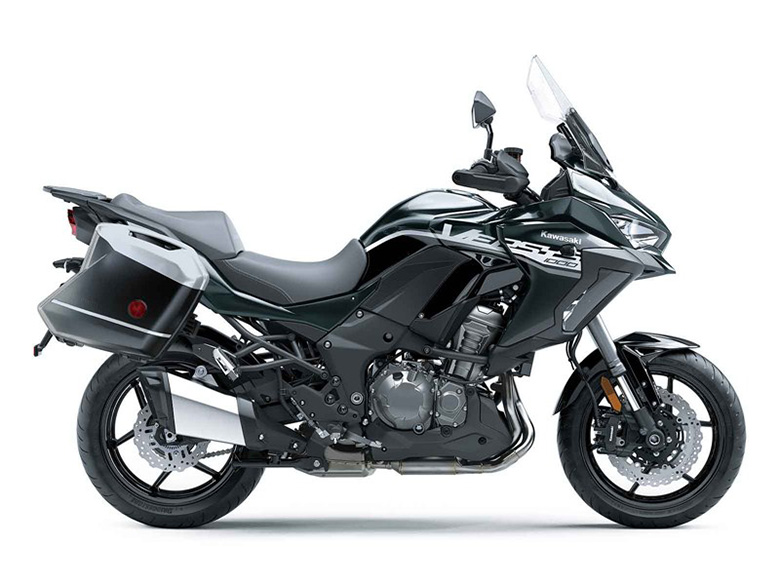
The frame comes in a 5-piece cast aluminum construction consisting of a steering stem, two cross pieces, and left and right leading edges. The two main frame components contained open C-shaped cross sections and were die-cast to ensure a smooth surface finishing. The reinforcing pipes join the engine hangers giving increased chassis rigidity to suit the long-suspension configuration. The rear sub-frame is a steel pipe trellis unity that allows the bike’s high payload. The welds are strategically placed to ensure ultimate appearance.
Moreover, the frame uses four engine mounts. The upper rear crankcase mount and the front cylinder mounts come with rubber to help prevent vibration and offer excellent handling characteristics. The standard center stand comes as standard for utility and ease of maintenance. The new horizontal back-link linkage is placed atop the swingarm for more excellent mass centralization and room for the exhaust pre-chamber. The damping is adjusted electronically to suit the motorcycle and suspension stroke speeds. The deceleration is also considered to help control the natural pitching under braking.
Brakes / Tires
The new large 310mm front petal discs are gripped by opposed 4-piston radial-attachment Monobloc calipers with differentiated diameter pistons. The new highly rigid Monobloc calipers contribute to superb feel and greater stopping power. The radial-pump front brake master cylinder helps to give the exquisite sense offered by the calipers. Squeezing the lever delivers a linear increase in brake force for better brake control. The front brake reservoir tank comes in smoked plastic finishing, thus adding a classy touch to the cockpit area.
Kawasaki 2020 Versys 1000 ABS LT Canada Sports Tourer – Technical Specifications
Engine
| Displacement | 1043cc |
| Type | 4-stroke In-Line Four-cylinder |
| Bore & stroke | 77mm x 56mm |
| Cooling | Liquid |
| Compression ratio | 10.3:1 |
| Valve system | DOHC, 16-valve |
| Fuel system | Digital fuel injection: 38 x 4 |
| Ignition | Digital |
| Lubrication | Forced lubrication, wet sump |
Brakes
| Front: type | Dual semi-floating 310mm petal discs |
| Front: calipers | Dual radial-mount, monobloc, opposed 4-piston |
| Rear: type | Single 250mm petal disc |
| Rear: calipers | Single-piston |
Dimensions
| Overall length | 2,270mm |
| Overall width | 895mm |
| Overall height | 1,465mm |
| Wheelbase | 1,520mm |
| Ground clearance | 150mm |
| Seat height | 840mm |
| Curb mass | 253kg |
| Fuel capacity | 21-liter |
Drivetrain
| Transmission | 6-speed, return |
| Final drive | Chain |
| Primary reduction ratio | 1.627 (83/51) |
| Gear ratio: 1st | 2.692 (35/13) |
| Gear ratio: 2nd | 1.950 (39/20) |
| Gear ratio: 3rd | 1.529 (26/17) |
| Gear ratio: 4th | 1.304 (30/23) |
| Gear ratio: 5th | 1.136 (25/22) |
| Gear ratio: 6th | 0.958 (23/24) |
| Final reduction ratio | 2.867 (43/15) |
| Clutch | Wet multi-disc, manual |
Frame
| Type | Aluminum twin-tube |
| Front-wheel travel | 150mm |
| Front Tire | 120/70ZR17M/C (58W) |
| Rear-wheel travel | 152mm |
| Rear Tire | 180/55ZR17M/C (73W) |
| Caster (rake) | 27-degree |
| Trail | 106mm |
| Steering angle (left/right) | 34-degree / 34-degree |
Performance
| Peak Power | 88kW at 9,000rpm |
| Peak Torque | 102N.m at 7,500rpm |
Suspension
| Suspension, front | 43mm of inverted fork having rebound damping (right-side) and spring preload adjustability |
| Suspension, rear | Horizontal Back-link, gas-charged, having rebound damping and remote spring preload adjustability |
Details
| Warranty | 24 months warranty |

